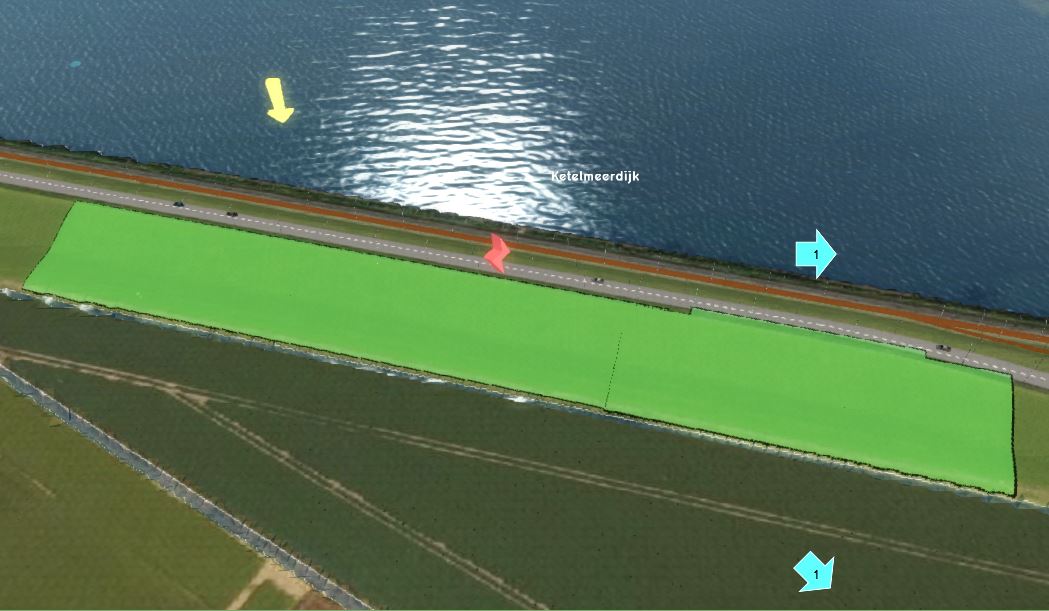Falen keringen template
Het falen van keringen is een van de toepassingen van het Tygron Platform. Hiervoor is een template project genaamd Falen keringen template gemaakt. Om dit template effectief in te kunnen zetten is deze handleiding gemaakt. Daarin wordt de te volgen werkwijze beschreven en worden aandachtspunten beschreven.
Required data
- AHN100x100.geojson
- Peilgebieden.geojson
- Duikers_WVS_041219.geojson
- Peilen hoofdsysteem Noord 121219.geojson
Experience with using the Tygron Platform and using the Geo data wizard is required.
Steps
Below the steps for using the template project on a new project area and to calculate and export the results for further analysis.
Apply template on new project area
Falen keringen template:
- Log in op het Tygron Platform; de LTS
- Bekijk de headlines om te zien of er geen storingen, bijvoorbeeld bij het inladen van een bepaalde dataset
- Klik op New Project
- Typ de naam in van het nieuwe project en klik op Use Falen keringen template
- In de volgende stap zoom je naar het gebied waar je een nieuw project van wilt maken op de kaart. Pas desgewenst de grootte van het vierkant/ de rechthoek aan om de grootte van het project aan te passen. Het gedeelte in het vierkant/rechthoek wordt het 3D-model. Klik op de knop Generate map.
- Het nieuwe project wordt nu gegenereerd vanuit de verschillende data bronnen.
Import water level areas
Falen keringen template:
- Open the Geo data wizard
- Click on next and choose for Areas
- In the next step choose to Import a GeoJSON file and select the file Peilen hoofdsysteem Noord 121219.geojson
- In step 2, set the slider on 20m to create polygons from the point data.
- Choose the attribute .... for the name of the water level areas in step 5.
- Finish the wizard
- In the Current tab, click on the button Overlays
- Select the overlay Peilen hoofdsysteem from the left panel and and click on Add areas with attribute in the bottom right corner.
- In the panel that pops up, choose the attribute .... and click on Add.
Define breach location
Falen keringen template:
- Add a new Area to the project. This will be the breach area.
- Draw the breach area in the 3D world, in the location where the water from the breach should emerge (see tips below in gallery).
- Add an Attribute to the created Area, with the breach height attribute name and a height value.
-
It is best to draw the breach area not too close to the water body. Also, the breach area does not have to cover the whole levee, but only the slope of the levee on the side of the area that is going to inundate.
Choose as attribute name for the breach height: Breslocatie_1.
Flooding overlay configureren
Breach
Falen keringen template:
- In the right panel, click on Configuration wizard to start the wizard
- In step 1, specify the time for the simulation calculation period.
- In step 2.1 select your breach area from the dropdown menu and fill in:
- Vaste hoogte en breedte (laat stroomsnelheid leeg)
- Use external area.
- External surface level lager dan breshoogte.
- Gebruik gemeten waterpeilen en/of de eerder ingeladen peilen van Peilen hoofdsysteem Noord 121219.geojson voor de bepaling van het waterlevel.
- Vuistregel voor het oppervlak: 10 x het debiet dat door de bres stroomt (te checken via show water balance). Dit komt overeen met een peildaling van 10 cm. Beter te groot dan te klein (worstcase). Ordegrootte: 10.000.000 m2.
- Is de verwachte waterdaling in het hoofdsysteem bekend, hou daar in het te hanteren oppervlak dan rekening mee.
Culverts
Falen keringen template:
- Choose from step 2.3 to 2.6.1 the option Do nothing and proceed with next.
- In the step 2.6.4 Culverts, if there are already culverts present: click on Erase all and start again and in the panel that pops up click on Erase all culverts. Then select Import culverts and click on Import culverts.
- In the Geo data wizard select the file Duikers_WVS_041219.geojson
Finish wizard
Falen keringen template:
- Choose from step 2.6.3 to 2.6.5 the option Do nothing
- In step 3 and 4 proceed with next.
- In step 5 make sure the Surface elevation, Surface max speed, Surface max value and Base types are checked. Kies het aantal tijdstappen met inachtneming van de rekenperiode (die in step 1 is ingevuld), zodat je bijvoorbeeld uitkomt op tijdstappen van een uur of dag.
